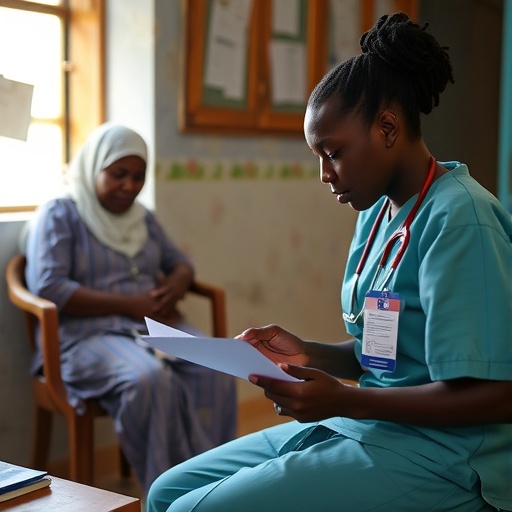In a pivotal study, researchers have underscored the substantial gap in awareness surrounding incident reporting practices among nurses in Mogadishu, Somalia. This study was led by A.H. Elmi in collaboration with R.A. Hassan and A.O. Abdi, aiming to delve into the intricacies of both knowledge and the barriers to effective incident reporting in a healthcare system that grapples with myriad challenges. The findings not only shed light on the perceptions of the nursing workforce but reveal broader systemic issues that could significantly affect patient care and safety in healthcare environments.
The backdrop of this important research highlights an alarming trend in global healthcare where effective communication about incidents leading to patient harm remains underdeveloped. The focus on Somalia is particularly significant, given the country’s complex healthcare landscape, shaped by years of conflict and instability. Previous studies indicate that inadequate reporting systems often lead to repeated errors, stifling the potential for learning and improvement within healthcare institutions.
According to the clinical findings presented, there exists a glaring deficiency in the awareness of reporting procedures among nursing staff. A majority of the participants admitted to a lack of knowledge regarding how to report incidents effectively, showcasing a need for urgent educational interventions. This lack of understanding can lead to a culture of silence, where healthcare practitioners may not voice concerns about errors, thus perpetuating a cycle of unaddressed issues within facilities.
Moreover, barriers to reporting are multifaceted. The study identifies several inhibitors, ranging from fear of repercussions to structural complexities within the healthcare system. In a setting marked by resource scarcity, nurses often prioritize immediate patient care over procedural documentation, leading to a pragmatic but detrimental approach to incident management. This shortfall not only hinders the progress of organizational learning but also raises ethical questions surrounding patient safety practices.
On the other hand, the importance of creating a safe environment in which healthcare professionals can report incidents without fear is crucial. Implementing a non-punitive reporting system is essential for cultivating a culture of accountability and transparency. Nurses need assurance that their reports will be used constructively to enhance safety protocols rather than to assign blame. This fundamental change could empower nursing staff to engage actively in the reporting process, contributing valuable data that could lead to improved healthcare outcomes.
The study advocates for the necessity of comprehensive training programs centered on incident reporting. Tailored educational initiatives could equip healthcare workers with the knowledge and skills required to navigate reporting systems confidently. By enhancing awareness and competencies among nurses, health organizations can foster an environment in which reporting becomes an integral aspect of their practice rather than an afterthought.
Looking ahead, the implications of these findings extend beyond the classroom and into policy-making. Empowering nurses through robust training can drive systemic change within healthcare systems, ultimately leading to reduced incidents of harm. Policymakers need to recognize the pivotal role of nursing in patient safety and ensure that resources are allocated to improve reporting practices and resolve existing barriers.
Furthermore, these insights advocate for the development of clear and accessible reporting mechanisms tailored to the contextual realities of healthcare in Somalia. Given the diversity of healthcare configurations globally, a ‘one-size-fits-all’ approach is ineffective. Localized strategies can significantly enhance both the reporting and management of incidents, leading to better outcomes overall.
In a world increasingly focused on patient safety, the study’s findings resonate with global efforts to create better healthcare systems. As healthcare workers worldwide confront similar challenges in incident reporting, Somalia’s experiences offer essential lessons on the importance of awareness and systematic support within the nursing community.
A call to action emerges, suggesting that healthcare systems, especially in resource-limited settings, must prioritize training in reporting practices. Facilitating a culture of openness and continuous education will not only empower nurses but also enhance the care provided to patients, ultimately benefitting the healthcare system as a whole.
Elmi, Hassan, and Abdi’s research stands as a clarion call for ongoing dialogue around patient safety and incident reporting. As the healthcare community grapples with these pivotal issues, the overarching goal remains: to ensure that every patient receives safe, high-quality care, ultimately leading to a healthier future for all.
Through this examination, it becomes abundantly clear that addressing barriers to incident reporting among nurses is not merely a procedural necessity; it is a moral imperative in safeguarding patient lives.
Subject of Research: Awareness and barriers to incident reporting among nurses in Mogadishu, Somalia.
Article Title: Awareness of reporting practices and barriers to incident reporting among nurses in Mogadishu, Somalia.
Article References:
Elmi, A.H., Hassan, R.A., Abdi, A.O. et al. Awareness of reporting practices and barriers to incident reporting among nurses in Mogadishu, Somalia.
BMC Nurs 24, 1134 (2025). https://doi.org/10.1186/s12912-025-03799-y
Image Credits: AI Generated
DOI:
Keywords: Incident reporting, nursing practices, patient safety, Mogadishu, Somalia, healthcare barriers.




